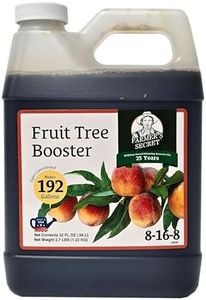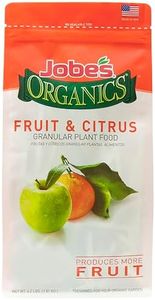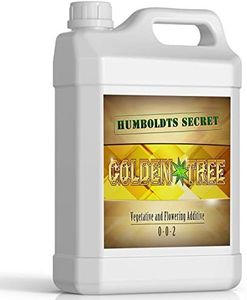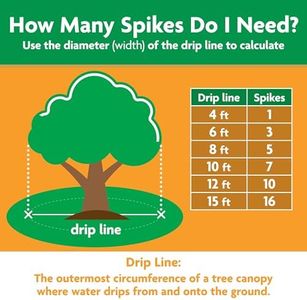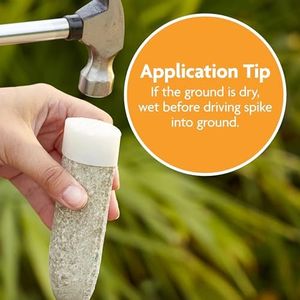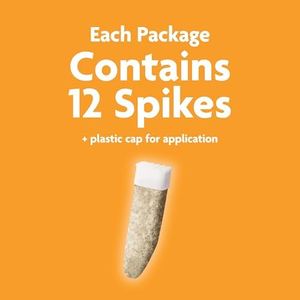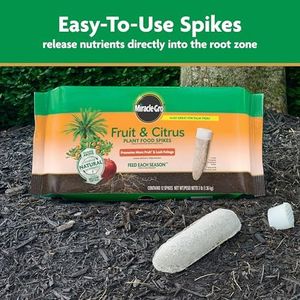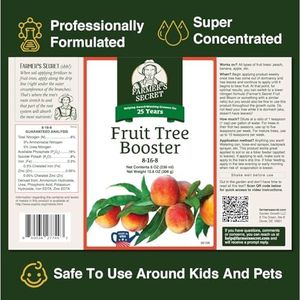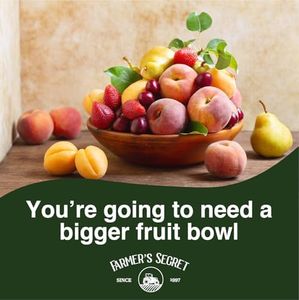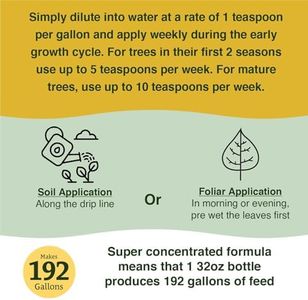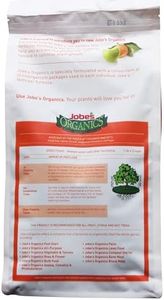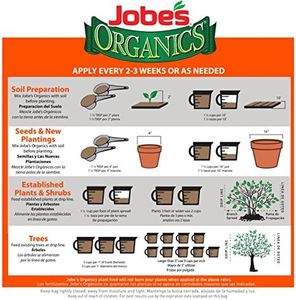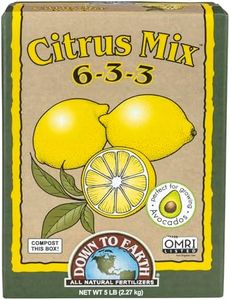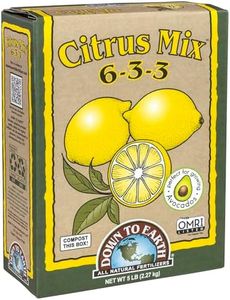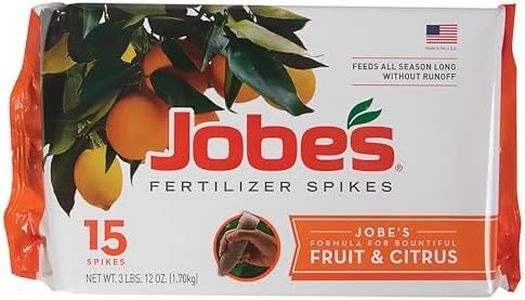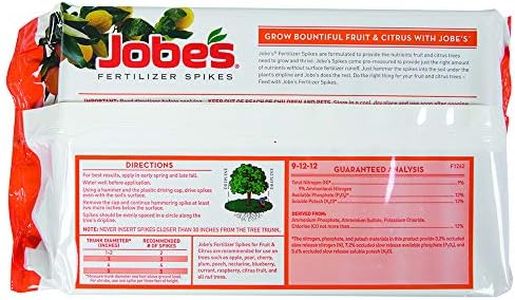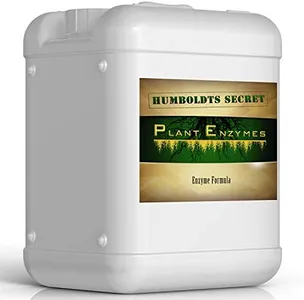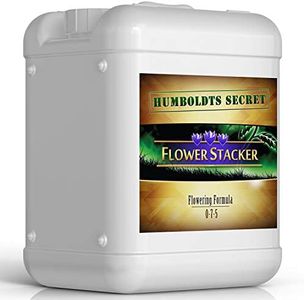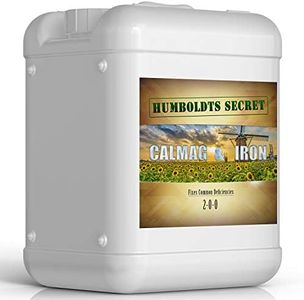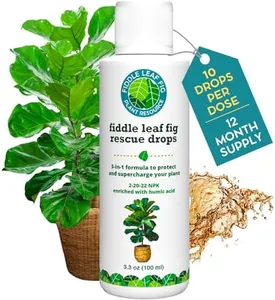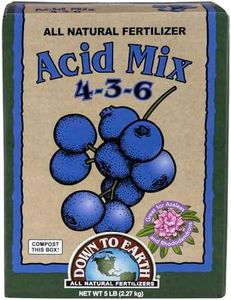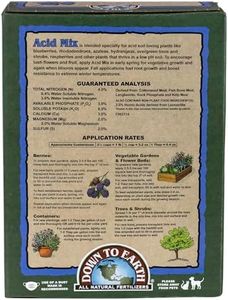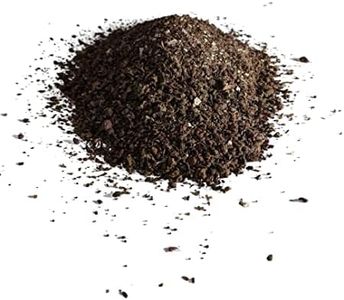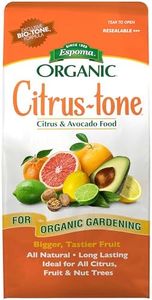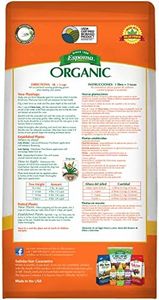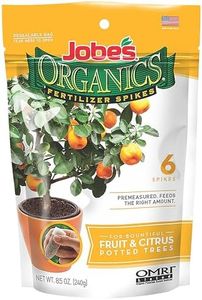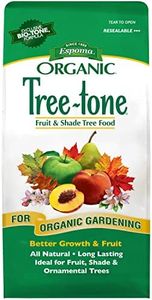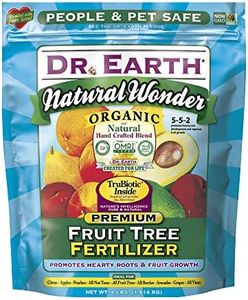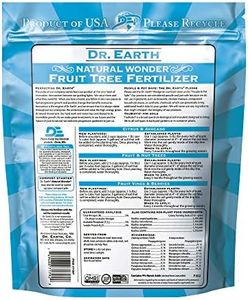10 Best Fruit Tree Fertilizers 2025 in the United States
Winner
Miracle-Gro Fruit & Citrus Plant Food Spikes
Miracle-Gro Fruit & Citrus Plant Food Spikes are designed to promote more fruit and lush foliage for fruit and citrus trees, as well as palm trees. These spikes contain natural ingredients and are easy to use, releasing nutrients directly into the root zone to strengthen the plants.
Most important from
20621 reviews
Farmer's Secret Fruit Tree Booster Fertilizer (32oz) - Super Concentrated and Phosphorus Rich - Formulated for All Fruit Trees Including Peach, Banana, and Apple
Farmer's Secret Fruit Tree Booster Fertilizer is a liquid fertilizer specifically designed to support the growth and yield of various fruit trees, including peaches, bananas, and apples. With a super concentrated formula, it offers an impressive N-P-K ratio that aids in optimal growth during the early stages of a fruit tree's life cycle, which is crucial for setting the foundation for a fruitful harvest.
Most important from
506 reviews
Jobe’s Organics Granular Garden Fertilizer, Easy Plant Care Fertilizer for Fruit and Citrus Plants and Trees, 4 lbs Bag
Jobe’s Organics Granular Garden Fertilizer is an excellent choice for those looking to nourish their fruit and citrus plants. With a balanced NPK ratio of 3-5-5, it is designed to promote healthy growth, vibrant foliage, and increased yields. One of the standout features is its organic composition; it contains no synthetic chemicals and is OMRI listed, making it suitable for organic gardening aficionados. This ensures that you can feed your plants without the worry of harmful residues, which is a big plus for environmentally conscious gardeners.
Most important from
4557 reviews
Top 10 Best Fruit Tree Fertilizers 2025 in the United States
Winner
9.7 score
Miracle-Gro Fruit & Citrus Plant Food Spikes
Miracle-Gro Fruit & Citrus Plant Food Spikes
Chosen by 1419 this week
Farmer's Secret Fruit Tree Booster Fertilizer (32oz) - Super Concentrated and Phosphorus Rich - Formulated for All Fruit Trees Including Peach, Banana, and Apple
Farmer's Secret Fruit Tree Booster Fertilizer (32oz) - Super Concentrated and Phosphorus Rich - Formulated for All Fruit Trees Including Peach, Banana, and Apple
Jobe’s Organics Granular Garden Fertilizer, Easy Plant Care Fertilizer for Fruit and Citrus Plants and Trees, 4 lbs Bag
Jobe’s Organics Granular Garden Fertilizer, Easy Plant Care Fertilizer for Fruit and Citrus Plants and Trees, 4 lbs Bag
Down to Earth Organic Citrus Fertilizer Mix 6-3-3, 5 lb
Down to Earth Organic Citrus Fertilizer Mix 6-3-3, 5 lb
Jobe’s Garden Fertilizer Spikes, Easy Plant Care Slow Release Fertilizer for Fruit and Citrus Plants and Trees, 15 Count
Jobe’s Garden Fertilizer Spikes, Easy Plant Care Slow Release Fertilizer for Fruit and Citrus Plants and Trees, 15 Count
Down to Earth All Natural Acid Mix Fertilizer 4-3-6, 5 lb
Down to Earth All Natural Acid Mix Fertilizer 4-3-6, 5 lb
Espoma Organic Citrus-Tone 5-2-6 Natural & Organic Fertilizer and Plant Food for All Citrus, Fruit, Nut & Avocado Trees; 4 lb. Bag. Promotes Vigorous Growth & Abundant Fruit
Espoma Organic Citrus-Tone 5-2-6 Natural & Organic Fertilizer and Plant Food for All Citrus, Fruit, Nut & Avocado Trees; 4 lb. Bag. Promotes Vigorous Growth & Abundant Fruit
Jobe’s Organics Garden Fertilizer Spikes, Easy Plant Care Fertilizer for Fruit and Citrus Plants and Trees, 6 Count
Jobe’s Organics Garden Fertilizer Spikes, Easy Plant Care Fertilizer for Fruit and Citrus Plants and Trees, 6 Count
Espoma TR4 4-Pound Tree-Tone 6-3-2 Plant Food , 4 pounds
Espoma TR4 4-Pound Tree-Tone 6-3-2 Plant Food , 4 pounds
7.1 score
Dr. Earth Natural Wonder Fruit Tree Fertilizer 4 lb
Dr. Earth Natural Wonder Fruit Tree Fertilizer 4 lb
Our technology thoroughly searches through the online shopping world, reviewing hundreds of sites. We then process and analyze this information, updating in real-time to bring you the latest top-rated products. This way, you always get the best and most current options available.


